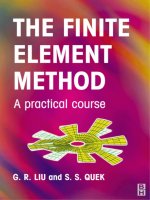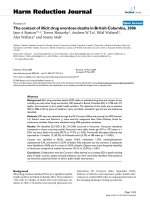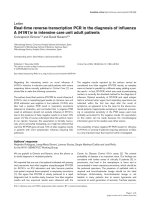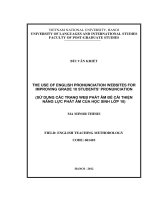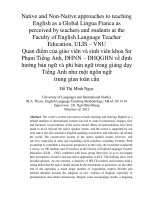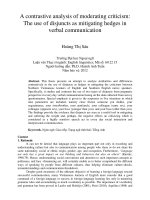The sound of english a practical course in british english pronunciation
Bạn đang xem bản rút gọn của tài liệu. Xem và tải ngay bản đầy đủ của tài liệu tại đây (12.13 MB, 0 trang )
The
Sound of English
A Practical Course in British English Pronunciation
Interactive E-book with Audio
Copyright © Joseph Hudson 2012, 2013
All rights reserved. No part of this document may be reproduced or transmitted
in any form or by any means, electronic, mechanical, photocopying,
recording, or otherwise, without prior written permission of Joseph Hudson.
ISBN 978-0-9573836-2-3
Published by
Pronunciation Studio
37 Gray’s Inn Rd | London | WC1X 8PQ | 0207 4040777 | www.pronunciationlondon.co.uk
Index
Sounds
Intro
5-6 Consonants
7-8 Vowels
1
17-18 Fricative
Consonants
Comparison
Structure
Intonation
Postscript
9 ‘ghoti’
10 Schwa
11 Function / Content
12 Schwa Function
13 Patterns
14 Usage
19-20 vs ð
21-22 < s > Endings
23-24 Schwa Function
Words
25-26 Sentence
27 Homographs
Stress / Tonic Syllable
29-30 Long Vowels
31-32 ɪ vs i:
33-34 Silent < r >
35-36 2 Syllable Words
37-38 Wh- Questions 39 Homophones
3
41-42 Plosive
Consonants
43-44 Glottal Stop
vs /t/
45-46 < ed > Endings
47-48 3 Syllable Words
49-50 Yes/No
Questions
51 Silent
Syllables
4
53-54 Short Vowels
55 /h/ Fricative
56 < h > Function
57-58 Silent Letters
59-60 Joining
61-62 Prominence
6 Verb/Noun
Stress
5
65-66 Approximant
Consonants
69-70 < oo >
71-72 Vowel Joining
73-74 Question Tags
75 ‘have’
6
77-80 Diphthong
Vowel Sounds
81-82< o >
83-84 Compounds
85-86 High-fall
87 ‘do’
7
89-90 Nasal
Consonants
91-92 ŋ vs ŋg
93-94 < a >
95-96 Double Stress
Compounds
97-98 Fall-rise
99 ‘are’
8
101-102 Affricate
Consonants
103-104 Long vs
Short Vowels
105-106 Contractions 107-108 Stress Shift
109-110 Adverbials
111 Phrasal
Verbs
2
-
Spelling & Sound
67 Weak ə vs ɪ
68 Weak ɪ vs i
-
15 IPA
How to Use this E-Book
‘The Sound of English’ is a fully interactive pdf with the following features:
•Audio: click on the icons next to each activity to hear the audio.
•Index: click on the page you require to go straight there.
•Answer Key: click on the question mark to go straight to the answers.
Sentence Stress | Intonation
Audio appears with this symbol
click it to hear the file.
- Listen to the following exchange.
A “What would you like?”
B “A cup of tea.”
2.16
Explanations appear in grey boxes.
?
- Which words are stressed?
- Of the stressed words, which words are strongest?
!
In spoken English we stress content words.
!
One word in every sentence is more stressed than the others.
!
Normally the last content word is the most stressed word.
EXERCISE
Exercises should be completed
then checked in the answer key.
- Match the content words on the left with the content words on the right.
pair
beef
pint
bread
leg
bunch
Answer Key is linked to by
clicking the red question mark.
a
?
bag
glass
book
joint
loaf
poems
wine
of
shoes
milk
flowers
lamb
crisps
?
DRILL
Drills should be repeated with
the audio until produced accurately.
- Repeat the rhythm followed by each sentence from the exercise:
2.17
.x.X
. x . X | a pair of shoes
Visit us at www.thesoundofenglish.org for more
activities, news and course info!
Follow us on Facebook & Twitter for updates:
© Joseph Hudson 2012
Introduction
!!!
'') ' Y'+
Sounds
- Consonants
- Vowels
Spelling & ‘ghoti’
Sound Schwa
Structure Function & Content
Intonation
Patterns
Usage
/!pɜ:sənli/
Postscript IPA
Answer Key Pages 113-114
4
© Joseph Hudson 2012
Consonant Types | Sound
✦
Consonant sounds are produced by blocking air as it leaves the mouth.
✦
This course shows you how to pronounce all 25 consonant sounds of English.
✦
Below is an example of each consonant sound - listen and read them.
Type of Sound
Sound
Example 1
Example 2
p
pin
cap
b
bag
robe
t
time
late
d
door
feed
k
cash
sock
0.1
plosive
(complete block of air followed
by explosion)
g
ʔ
girl
-
flag
football
f
full
knife
v
vest
cave
θ
think
earth
ð
those
bathe
s
sight
kiss
z
zoo
nose
ʃ
shirt
crash
ʒ
-
pleasure
h
high
-
affricate
tʃ
chose
catch
(plosive followed by fricative)
dʒ
joy
stage
nasal
m
mood
calm
n
now
turn
ŋ
-
bang
w
wall
-
j
yellow
-
r
room
-
l/ɫ
law
pill
fricative
(constant flow of air “squeezed”
through a block, sounds like
friction)
(air is released through the nose)
approximant
(vowel-like consonant, no full
block of air occurs)
5
© Joseph Hudson 2012
Consonant Articulation | Sound
We use the articulators: tongue, lips & teeth, to block air.
✦ The places where we block air in English are shown below.
t lY
✦
tool
alveolar ridge
velum
lips
teeth
palate
tongue
glottis
EXERCISE
k/g/ŋ
m/p/b
-f<
q
f/v
tool
C,e ,;1
4.
t/d/l/n
t lY
Af
θ/ð
'') ' Y'+
1.
- Listen to the recording and match the sounds in the boxes with their articulation
diagrams (number 1 has been done). The arrows point to the place of articulation.
2.
3.
wl il)
0.2
h/ʔ
6.
5.
- Check your answers in the answer key on page 112.
6
© Joseph Hudson 2012
Vowels | Sounds
✦
✦
✦
✦
A neutral English accent has 19 vowel sounds.
There are 3 types of English vowel sound - short, long and diphthong.
English spelling does not always show us which sound to pronounce.
We will learn how to pronounce each individual vowel sound on this course.
Type of Sound
0.3
short
(single mouth
position)
long
(single mouth
position)
diphthong
(double mouth
position)
Sound
Spellings
Examples
ə
a, e, o, u
alive, the, today, supply
ɪ
i
thin, sit, rich
ʊ
u, oo, ou
put, look, should
e
e, ea, ie
went, bread, friend
ʌ
u, o
fun, love, money
æ
a
cat, hand, fan
ɒ
o, a
rob, top, watch
i:
ee, ea
need, beat, team
u:
ew, oo, o_e
few, boot, lose
ɜ:
ir, ur, wor
third, turn, worse
ɔ:
al, aw, or, our, oor
talk, law, port
ɑ:
a, al, ar
glass, half, car
eɪ
ay, ea, ae, ai
pay, great, maid
ɔɪ
oi, oy
noise, toy, choice
aɪ
ie, i_e, i, y
fine, like, might
əʊ
o, o_e, oa
no, stone, road
aʊ
ou, ow
round, how, brown
ɪə
eer, ear
beer, hear, steer
eə
are, ere, ea, ai
care, there, bear
7
© Joseph Hudson 2012
Vowel Articulation| Sounds
✦
A vowel sound is made by shaping the mouth as air flows out.
✦
Articulators used to shape the mouth are: tongue, lips and jaw.
✦
The chart below shows examples of mouth positions in English.
Position
0.4
tongue
Example
lips
jaw
y-,C"rL
y-,C"rL
>rr"f
,na1
,na1
)
)
>rr"f
front
spread
close
centre
relaxed
mid
back
rounded
open
i: (keep)
ɜ: (bird)
y-,C"rL
,na1
>rr"f
)
ɒ (watch)
DRILL
- Repeat the following sentences. Notice your jaw opening each time.
0.5
1. Keep this red bag.
2. Who took Paul’s watch?
3. The bird runs fast.
- Which sentence contains only rounded vowels?
8
© Joseph Hudson 2012
Introduction | Spelling & Sound
0.6
- English spelling does not always indicate pronunciation.
- It was famously claimed that the word ‘fish’ could be spelt ‘ghoti’ because:
‘gh’ in ‘enough‘ is pronounced /f/
‘o’ in ‘women’ is pronounced
/ɪ/
‘ti’ in ‘motion’ is pronounced /ʃ/
so ‘ghoti’ could be pronounced /fɪʃ/!
✦
✦
The pronunciation of many English sounds can be predicted by their spelling.
The ‘Spelling & Sound’ section shows you how to select sounds accurately by
interpreting spelling.
EXERCISE
- Each group of words contains an identical spelling.
- Circle the word that you think is pronounced differently from the others.
loose
1. goose
2. nose
rose
3. played
author
5. paid
maid
but
7. none
0.7
lose
stopped
4. father
6. put
choose
liked
Northern
said
hut
done
gone
8. foot
book
food
9. slow
now
cow
10. word
work
11. watch
wall
worn
was
- Listen and check your answers.
9
© Joseph Hudson 2012
Schwa | Spelling & Sound
- Match the words below with the IPA transcription on the right:
Word
around
0.8
IPA Transcription
!mænə
6
manner
!seɪlə
sailor
!kæktəs
cactus
ə!raʊnd
- Which sound appears in every IPA transcription?
0.9
✦
The schwa sound /!/ can be spelt as < a >, < e >, < o > and < u >.
✦
The schwa is the most common vowel sound in English.
✦
The schwa is weak - it can never be stressed.
✦
The production of the schwa is neutral: lips, jaw and tongue are relaxed.
EXERCISE
- Every word in the box below contains one schwa sound.
- Listen to the recording and underline the schwa in each word.
0.10
servant
bacon
_ persist
_
_ picture commit alive
jumper sublime London salad Peru structure
suggest soldier persuade combine balloon
terror cushion scripture tighten sofa Russia
- Think of any word in English with 3 syllables or more.
- How many schwa sounds does it contain? Check in a dictionary.
EXAMPLE: ‘conspiracy’ = 2 schwa sounds.
10
© Joseph Hudson 2012
Function & Content | Structure
- Listen to the sentence below:
“Shall we go for a walk?”
0.11
- Which words are stressed? Why?
✦
Spoken English is divided into function and content words.
✦
Function words carry only grammatical meaning, such as:
Word Type Examples
prepositions
auxiliaries
articles
quantifiers
pronouns
✦
to from for of with by
are was do have could would shall can
a an the
some any few all
he she it you I this that
Content words carry real meaning such as:
Word Type Examples
nouns
verbs
adjectives
adverbs
car wedding James table joy
move drink turn enjoy think
big interesting quiet slow bright
quickly quietly fortunately often again
EXERCISE
- In the sentences below, underline the function words:
0.12
1.
2.
3.
4.
5.
6.
Can we go for a swim in the sea?
It’s a beautiful day in the South of England.
How do you want to pay for this, sir?
Jessica Smith is required in ‘Arrivals’ immediately.
When you get to the station, give me a call.
Would you like some of my carrot cake?
11
© Joseph Hudson 2012
Schwa Function Words | Structure
- Read and listen to the passage below, the schwa sound is written in IPA:
I’d like t! go shopping f!r ! pair !f shoes, b!t th!
shops ! closed bec!se th!s ! weath!r !lert. !parr!ntly
lots !f snow is coming in fr!m th! Highl!nds so th!
gov!rnm!nt h!v !dvised peop!l t! stay !t home.
0.13
- Which function words are pronounced with a schwa sound in the passage?
✦
Many function words are pronounced with schwa when they are weak.
✦
If a function word is stressed, it can not be pronounced with schwa.
✦
Function words are always strong when said alone.
DRILL
- Say the word on the left alone (strong), then say it in the sentence on the right using
the schwa sound (weak):
Word Sentence
(STRONG) (WEAK)
0.14
1
to /tu:/
I went to work early. /tə/
2
are /ɑ:/
What are you doing? /ə/
3
was /wɒz/
4
from /frɒm/
This cardʼs from my family. /frəm/
5
there /ðeə/
There werenʼt enough drinks. /ðə/
6
can /kæn/
Where can we buy a map? /kən/
7
her /hɜ:/
Her carʼs broken down. /hə/
8
for /fɔ:/
Iʼll repeat for the last time! /fə/
Was it warm in Greece? /wəz/
12
© Joseph Hudson 2012
Introduction | Intonation
- Listen to the following question being answered in three different ways:
A Johnny, have you finished
your homework?
0.15
1. ↘Yes
B 2. ↘ Yes
3.
Yes
- Which answer (B) means i) maybe ii) definitely iii) why are you asking me?
✦
Spoken English uses 3 intonation patterns - fall, fall-rise & rise.
✦
Intonation shows us the speaker’s attitude to what they are saying.
DRILL
- Repeat after the recording:
0.16
1. a)↘Yes b)↘
2. a)↘No b)↘
Yes c) Yes
No c) No
EXERCISE
- Listen to the conversations and circle the answer you hear:
0.17
1. Are you married?
Yes ↘ ↘
2. Did you enjoy the film?
Yes ↘ ↘
3. Can you afford this meal?
Yes ↘ ↘
4. You’re drunk, aren’t you?
No ↘ ↘
5. Is this your first class?
No ↘ ↘
6. Did you eat all the chocolate? No ↘ ↘
13
© Joseph Hudson 2012
Usage | Intonation
✦
Intonation shows us a speaker’s attitude to their words.
✦
This course will show you how to produce English intonation in your speech.
✦
Some important examples of intonation usage are displayed below.
EXERCISE
1. ATTITUDE
- Listen to the following conversation twice:
0.18
A “Dad, I’ve got some news, I’m getting married!”
B “Excellent”
i) How is the father’s reaction different in each case?
ii) How does he show this with intonation?
2. IMPLICATION
- Listen to the following conversation twice:
0.19
A “What did you think of the film?”
B “It was good.”
i) What is the difference in meaning between the two versions?
ii) How is the intonation in the word ‘good’ different the second time?
3. REPETITION
Listen to the following conversation:
0.20
A “Who are you meeting tonight?”! B “Nicole Kidman.”
A “Who are you meeting tonight?”! B “Not the Nicole Kidman!”
- Person A says the same question twice, but the intonation is different the second
time. How does it change and why?
14
© Joseph Hudson 2012
IPA | Postscript
- Look at the dictionary entry for the word “personally”:
personally /!pɜ:sənli/
- What differences do you notice between the spelt and the IPA versions?
IPA (International Phonetic Alphabet) shows the way we pronounce words.
In English, the pronunciation of a word often differs from its spelling, making
IPA a very useful study tool to improve your pronunciation.
✦
✦
✦
Stress is marked in IPA using the symbol / ˈ/.
EXERCISE
i) Write the words from the box below into the chart next to their IPA transcription.
ii) Write the silent consonant from each word into the 3rd column.
cupboard island half often write know light lamb handbag autumn
0.21
Word
IPA
Silent Consonant(s)
1
autumn
ˈɔ:t#m
n
2
half
hɑ:f
l
3
læm
4
n#ʊ
5
ˈaɪl#nd
6
laɪt
7
ˈkʌb#d
8
raɪt
9
ˈɒf#n
10
ˈhænbæg
- Listen to the recording to check your answers and practise saying the words.
15
© Joseph Hudson 2012
Chapter 1
!!!
Fricative
Sounds
Consonants
fvθðszʃʒ
Sound /θ/ vs /ð/
Comparison
Spelling & < s > Endings
Sound
Schwa Function
Structure
Words
Intonation Sentence Stress
Postscript Homographs
Answer Key Pages 115-116
16
© Joseph Hudson 2012
Fricative Consonants | Sounds
- Fricatives are made by squeezing air between two articulators.
- There are 9 fricative consonant sounds in English (see chapter 5 for /h/):
s
z
ʃ
ʒ
<v>
video vet van vote vow leave move serve love
pave drove wives knives of*
< th >
tongue + teeth
third thought thing thumb theory tooth worth
path myth cloth month maths athlete health
< th >
these that other there the smooth bathe
although clothes mouths rhythm
< s, c, x >
alveolar
seed soup certain said south worse force case
nice mouse first past risk fax
< z, s >
zoo zip zone cheese lose Mars buzz because
lazy size rose design
< sh, ch, ti, s >
post-alveolar
f{
ð
fee food first face phone beef roof laugh
rough loft free flute fright flower
A,J
θ
teeth + lip
q
f
v
< f, gh, ph >
-f<
1.1
Position
Af
Sound Spellings / Examples
sheet shoe ship sugar champagne show marsh
Welsh rush cash sanction patient station
< s, g >
explosion Peugeot usual collage Asia measure
vision
17
© Joseph Hudson 2012
DRILL
1.2
f
Fred and Fiona phoned Fredʼs nephew in Finland on Friday.
2.2
I feel fabulously fit, laughed Alfred at Farnham food festival.
θ
Thanks for the theatre. I thought it was thrilling.
s
I must say, itʼs been so fabulous staying in such splendid surroundings.
ʃ
Sharon should show more patience in relation to her Welsh relations.
Cathyʼs methods as an orthodontist thoroughly thrash her methods
as a philanthropist.
Tonightʼ s supper is a choice: sea bass or a salad sandwich.
1.1
Should she sell shorts, shirts, fish and sea shells in the same shop?
v
Valerie drove the delivery van to Dover then vanished to Valencia.
ð
I gather that the rhythm of this is Northern, rather than Southern.
z
These lazy boozers spend their days dosing in a haze - Iʼm amazed.
ʒ
Have Vincent and Vicky invited David to their cave?
Donʼt bother with other paths, this oneʼs further but smoother than
the others.
As long as Zack remains in this business I wonʼt resign.
Did they measure the corrosion after the explosion in Asia?
Peugeotʼs vision is unusual Asian exposure.
18
© Joseph Hudson 2012
< th > | Sound Comparison
- Listen carefully to the two < th > sounds pronounced 4 times each:
1.3
1.
θ
2.
ð
- What differences are there between the two sounds?
EXERCISE
- Listen to the words in the box below and write them into the correct column in the
chart according to the pronunciation of < th >:
1.4
South Southern both thought this the thank those bathe bath
baths fifths rather author mouths mouth
months soothe
/θ/
/ð/
South
Southern
Check your answers before continuing.
- In the notes, write an example for each rule from the table above:
RULES
EXAMPLES
✦
Most content words are pronounced with /θ/
_____________
✦
All function words are pronounced with /ð/
_____________
✦
Verbs ending < the > are pronounced with /ð/
_____________
✦
Plural words ending < vowel + ths > are pronounced /ð/
_____________
✦
Plural words ending < consonant + ths > are pronounced /θ/ _____________
✦
Words containing < ther > are pronounced /ð/
_____________
EXCEPTIONS
Plurals pronounced /θ/: deaths, moths, cloths.
Content words pronounced /ð/: smooth, rhythm.
✦ ‘with’ and its derivatives (withdraw, within etc.) can be pronounced /θ/ or /ð/.
✦
✦
19
© Joseph Hudson 2012
EXERCISE
- Circle the odd word out in each line:
1.5
1. month mouth mouths moth
2. father
brother
mathematics
author heather further
3. thought healthy those atheist throw
4. months births clothes sevenths widths
5. this that the thin them
EXERCISE
“Go from start to finish only on
voiced /ð/ squares. You can only
move vertically and horizontally,
NOT diagonally.”
START
theory
bother
author
cloth
faith
birth
North
breathe
these
leather
athlete
both
South
thing
earth
father
breath
seventh
bath
thought
ninth
Southern
nothing
thousand
teeth
together
those
other
catholic
maths
feather
rhythm
theatre
death
threat
path
although
eighth
tooth
myth
anthology
ninth
FINISH
20
© Joseph Hudson 2012
< s > Endings | Spelling & Sound
- Listen to the following sentence:
Why’s Matt’s son wearing those badges?
1.6
- How is the < s > at the end of each bold word pronounced?
- Why has the < s > been added to each word?
When we add an < s > to a word (root), the following rule applies:
1.7
Root words ending in voiceless sounds + < s > will be pronounced /s/:
EXAMPLES: bits, shops, wants
✦
Root words ending in voiced sounds + < s > will be pronounced /z/:
EXAMPLES: shoes, things, ways
✦
Root words ending in: /s, z, ʃ, ʒ, tʃ, dʒ/ + < s > will be pronounced /ɪz/:
EXAMPLES: faces, watches, cages
✦
DRILL
Root ends with:
1.8
voiceless
sound
voiced
sound
/s, z, ʃ, ʒ, tʃ, dʒ/
Example
+s
cap
caps
state
states
tank
tanks
laugh
laughs
what
what’s
star
stars
rub
rubs
mug
mugs
show
shows
gather
gathers
miss
misses
lose
loses
push
pushes
match
matches
badge
badges
<s> sound
IPA
/s/
/kỉps/
/steɪts/
/tỉŋks/
/lɑ:fs/
/wɒts/
/z/
/stɑ:z/
/rʌbz/
/mʌgz/
/ʃ(ʊz/
/gỉð(z/
/ɪz/
/mɪsɪz/
/lu:zɪz/
/pʊʃɪz/
/mỉtʃɪz/
/bỉdʒɪz/
21
© Joseph Hudson 2012
EXERCISE
- Using the audio file, add an < s > to the words in the box, then place them in the
correct column according to their pronunciation.
top hand choose lob tank beg miss return fax want chase laugh surf
love create answer amaze pray alert push inch prefer match seem age
look climb badge crack interest
1.9
/s/
/z/
/ɪz/
tops
hands
chooses
- Check your answers and practise saying the words.
EXERCISE
- Circle the odd word out in each line:
1. draws stars employs requires devastates
2. raids lobs traces bugs remembers
3. invests sacks maps fails coughs
4. houses mashes rages passes drags
5. aims fails shelters grills talks
6. places stores tears retires alludes
1.10
- Check your answers and practise saying the words.
22
© Joseph Hudson 2012
Schwa | Structure
- Listen carefully to the sentence:
‘There are a few of them.’
1.11
- How many schwa vowel sounds were pronounced?
✦
✦
Function words are normally weak in pronunciation.
Many function words are pronounced with a schwa when they are weak.
DRILL
- Repeat at the same time as the recording using the schwa vowel sound for
every word then clapping your hands on the ʘ symbol:
1.12
1.
2.
3.
4.
5.
ʘ
ʘ
ʘ
ʘ
ʘ
to ʘ a ʘ the ʘ some ʘ
are ʘ were ʘ was ʘ have ʘ
that ʘ shall ʘ and ʘ would ʘ
her ʘ there ʘ for ʘ from ʘ
do ʘ does ʘ can ʘ but ʘ
EXERCISE
- Listen to the sentences and write the missing words in. All missing words are weak
function words pronounced with schwa:
1.13
1. ____ ____ parents coming ____ ____ show?
2. ____ we buy ____ chocolate ____ Margaret?
3. ____ ____ ____ card ____ Claire today.
4. ____ we meet ____ dinner in ____ bar?
5. What ____ I done ____ ____ dinner?
6. ____ you ____ I ask her?
7. ____ they think ____ we will?
23
© Joseph Hudson 2012
Stressed Function Words | Structure
✦
Function words are not pronounced with schwa if they are:
1. Stressed due to meaning.
EXAMPLE:
1.14
A Is that present from David?
B No, it’s for David!
2. At the end of the sentence/unit:
EXAMPLE:
A Who’s the present for?
B It’s for John.
EXERCISE
- In the following sentences, circle the bold words if they are pronounced with
schwa:
1.15
A Come on! It’s time to go to school!
1. to B Oh, but mum, do I have to?
A Where are you from?
2. from B I’m from Poland.
A Is this card for me?
3. for B I don’t know who it’s for.
4. are
5. was
6. were
A Kevin and Julie are getting married!
B Are they! How charming.
A Was Geoffrey at the lecture last night?
B Yes I think he was.
A If I were you, I’d find another job.
B I would if there were any other jobs
7. some A I’ve got some Belgian chocolate here!
B Oooo - can I have some?
8. can A Can anyone help me carry these bags?
B I can!
9. her A Sarah seems really upset! What did you say to her?
B I only told her to talk more quietly!
- Practise saying the conversations with the recording.
24
© Joseph Hudson 2012
Sentence Stress | Intonation
- Listen to the following exchange.
A “What would you like?”
B “A cup of tea.”
1.16
- Which words are stressed?
- Of the stressed words, which words are strongest?
✦
In spoken English we stress content words.
✦
One word in every sentence is more stressed than the others.
✦
Normally the last content word is the most stressed word.
EXERCISE
- Match the content words on the left with the content words on the right.
a
pair
pint
leg
bunch
bag
glass
book
joint
loaf
of
beef
bread
poems
wine
shoes
milk
flowers
lamb
crisps
DRILL
- Repeat the rhythm followed by each sentence from the exercise:
1.17
.x.X
. x . X | a pair of shoes
25
© Joseph Hudson 2012


